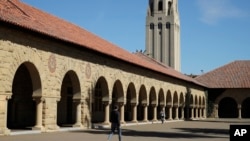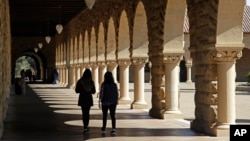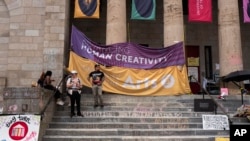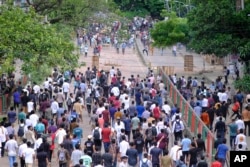Student Union
Arts Students Lament COVID Shutting Down Practices, Performances

A typical school day for Elon University junior Skyler Sajewski began at 7 a.m., starting with ballet, history, economics and tap classes, then rehersal for the upcoming musical. She would get back to her apartment around 11 p.m.
Then, the COVID pandemic hit.
The musical theater major who was used to “constantly running from place to place” returned home to Florida to shelter in place. She’s worried about missing out on “literally all of it” in terms of preparing for her future career.
“To be a well-rounded musical theater performer, you have to have a certain set of skills and be really good at them,” Sajewski said. “And you know, I go to a school to constantly get better. And this year, if I reach a plateau of no growth it could be potentially harming versus someone who went all their four years.”
Sajewski is not alone in her anxieties for the future. She has friends who are considering taking a semester -- or even a year -- off, realizing that an online arts education may not be worth it.
When she returned home, Sajewski and her peers were faced with “Zoom University” -- what many students are calling online classes -- as musical theater majors. In last semester’s acting class, she and her fellow “MTs,” were “literally screaming in each other’s faces” when they were working on Greek theater.
Into the screens of their laptops.
For a “pretty demanding” class “where you really have to get into your body and your voice,” moving to remote learning required adjustments.
“In acting, there's a lot of, with permission, there's a lot of touching,” Sajewski said. “We do partner warm ups, to get the voice open and ready by, patting them on the back really hard and doing all of this physical activity with your partner where you're in very close corners. [Then], the pandemic hits. We are now home, my lovely scene partner and I, that we're working on the Greek [acting class] and are now doing it over Zoom, which is incredibly hard because you can only see their face.”
Sajewski said it wasn’t ideal for acting class.
“How can you see what my face is doing? You know what I mean? So we acted right up to the camera. So even though the Greek piece is supposed to be a whole body experience, we were mostly just using our face. It's hard to act over Zoom. Like the whole point of acting is to react. And when you're reacting over a camera where someone could be frozen one second, it's just, it's not organic. It doesn't feel like it's supposed to feel, but you know, we did our best with it.”
Sajewski said she considered taking a gap year.
“When I found out that classmates of mine were doing that, and that idea became real to me, it honestly freaked me out because I've always known that I was graduating in 2022 when I was going to move to New York and start my life. And for that to be affected by this unprecedented pandemic is, is really scary to me.”
Sidney Rubinowicz said she plans to take a gap year from her production design studies at Carnegie Mellon University in Pittsburgh. Productions at Carnegie Mellon were canceled for the first semester and are planning on a double season for the second.
“Next year, I was going to start getting lead stage manager assignments,” Rubinowicz said. “And I would be really, really sad if I didn't have those. And for me, production is a bigger part of my education and my classes are, and I think a lot of people agree with that. So I will just be back in a year, hopefully things are better.”
The would-be junior at Carnegie Mellon says that she’s always been “five years ahead” in knowing what she wanted to do. Before middle school, she knew where she wanted to attend high school and in high school, she immediately knew where she wanted to go to college.
“It's so weird to be like, ‘I have no idea what I'm doing,’” she said. “I think I'm just a little more open minded now. And I think it's not even that, I was like, ‘You have to have a plan’ but … now everyone is thrown for a loop.”
Carnegie Mellon is not offering a refund on housing or tuition, but they will allow students to choose to stay or withdraw after 10 days on campus.
At Tisch School of the Arts at New York University -- like many other universities -- students are asking for partial reimbursement from the spring semester.
“NYU ignores the fact that us art students will be paying full price for an education that lacks the facilities, equipment, technology, services and hands-on experience we are explicitly paying for,” the petition stated.
“While we appreciate the concerted efforts of our professors to salvage what’s left of our education, we reject the assumption that an online Zoom education is equitable in content and value.”
Students wrote testimonials to represent the studios that they are a part of at Tisch. Dancers, actors, filmmakers and writers alike came together in a series of Google documents to tell the administration how they were feeling.
One student in dance program wrote that “these technique classes require specific equipment and a certain amount of space in order to be able to execute the exercises efficiently. Dancers also require physical attention and corrections from our instructors which is almost impossible to do on Zoom.”
Tisch later issued fee refunds.
When performing arts curriculums will resume in person at schools nationwide is unknown. Sajewski and her colleagues say they realize you don’t have to go to school to work in the arts. But a bachelor of fine arts has its benefits.
“You could very well just go out there and try your best, people can do it. They made [in the industry], they didn't go to school and they're fine,” she said. “But those of us that choose to go, further their education because we want to learn and better ourselves in the best way we know possible, which is through schooling. And if we can’t, you know, why am I going to school?”
Future job prospects, not always robust for artists, are fewer because of the pandemic.
“There's so many artists without a job right now. And it's scary.”
See all News Updates of the Day
Tips for first-year international students in the US

Book your flights right away, get a U.S. phone plan, make sure you have linens for your dorm and attend orientation – that’s some of the advice international students have for first-year college students coming from abroad.
U.S. News & World Report compiled helpful tips for students studying in the United States for the first time. (July 2024)
Survey: Social integration, career prep are important to international students

A recent survey of international students in the United States found that before starting school, they were concerned about personal safety, making friends and feeling homesick.
Inside Higher Ed reports that international students want specialized orientations, peer connections, career preparation and job placement to help make their college experiences successful. (July 2024)
US advisory council ends Nigeria visit, signs student exchange deal

Members of a U.S. presidential advisory council have approved a student exchange deal between an American college and a Nigerian university as part of the council's effort to strengthen collaboration on education, health, entrepreneurship and development between Africa and Africans living abroad.
The council also visited a health facility supported by the United States Agency for International Development in the capital.
Nigerian authorities and visitors chatted with members of the U.S President's Advisory Council on African Diaspora Engagement as they toured a healthcare facility in Karu, a suburb of Abuja, on the last day of the council's three-day visit to Abuja and Lagos.
The facility is one of many supported by the United States Agency for International Development, or USAID, to improve the management of childhood illnesses, family planning, immunization and delivery.
The tour was part of the council's effort to promote African diaspora-led investments in technology entrepreneurship, education and healthcare delivery.
"They're doing a phenomenal job there, it really gave us a sense of what the healthcare system is in Nigeria," said Deniece Laurent-Mantey, executive director of the advisory council. "This is our first trip as a council to the continent and we chose Nigeria for a reason — the diaspora in Nigeria is very active, very influential, and they're really a source of strength when it comes to our U.S.-Africa policy. And so for us coming to Nigeria was very intentional."
The council was created by President Joe Biden in September to improve collaboration between Africa and its diaspora in terms of economic and social development.
Akila Udoji, manager of the Primary Healthcare Centre of Karu, said officials in Nigeria were pleased that the council members were able to visit.
"We're happy that they have seen what the money they have given to us to work with has been used to do, because they have been able to assist us in capacity-building, trainings, equipment supply and the makeover of the facility," Udoji said.
Earlier, the council signed a deal for a student exchange program between Spelman College in the southern U.S. city of Atlanta and Nigeria's University of Lagos.
Laurent-Mantey said education exchanges are one of the council's top priorities.
"In Lagos, we had the president of Spelman College — she's also a member of our council — she signed an agreement with the University of Lagos to further education exchange programs in STEM and creative industries between those two universities," Laurent-Mantey said. "And I think for us it's very important, because Spelman College is a historically Black university, and so here we are promoting the importance of collaboration between African Americans and Africans."
In March, the advisory council adopted its first set of recommendations for the U.S. president, including the student exchange initiative, advocating for more U.S. government support for Africa, climate-focused initiatives, and improving U.S. visa access for Africans.
The council met with Nigerian health and foreign affairs officials during the visit before leaving the country on Wednesday.
American Academy of the Arts College announces closure

The American Academy of Art College in Chicago announced it would be closing after 101 years of preparing students for careers in art and illustration.
WTTW news reported that like other art colleges, the academy saw enrollment drop after the pandemic, and officials made the decision to close the college last month. (July 2024)
5 killed, dozens injured in clashes over Bangladesh jobs quota system

At least 5 people were killed and dozens injured in two separate incidents in Bangladesh as violence continued Tuesday on university campuses in the nation's capital and elsewhere over a government jobs quota system, local media reports said quoting officials.
At least three of the dead were students and one was a pedestrian, the media reports said. Another man who died in Dhaka remained unidentified.
The deaths were reported Tuesday after overnight violence at a public university near Bangladesh's capital, Dhaka. The violence involved members of a pro-government student body and other students, when police fired tear gas and charged the protesters with batons during the clashes, which spread at Jahangir Nagar University in Savar, outside Dhaka, according to students and authorities.
Protesters have been demanding an end to a quota reserved for family members of veterans who fought in Bangladesh's war of independence in 1971, which allows them to take up 30% of governmental jobs.
They argue that quota appointments are discriminatory and should be merit-based. Some said the current system benefits groups supporting Prime Minister Sheikh Hasina. Some Cabinet ministers criticized the protesters, saying they played on students' emotions.
The Bengali-language Prothom Alo daily newspaper reported that one person died in Dhaka and three others, including a pedestrian, were killed after they suffered injuries during violence in Chattogram, a southeastern district, on Tuesday.
Prothom Alo and other media reports also said that a 22-year-old protester died in the northern district of Rangpur.
Details of the casualties could not be confirmed immediately.
While job opportunities have expanded in Bangladesh's private sector, many find government jobs stable and lucrative. Each year, some 3,000 such jobs open up to nearly 400,000 graduates.
Hasina said Tuesday that war veterans — commonly known as "freedom fighters" — should receive the highest respect for their sacrifice in 1971 regardless of their current political ideologies.
"Abandoning the dream of their own life, leaving behind their families, parents and everything, they joined the war with whatever they had," she said during an event at her office in Dhaka.
Protesters gathered in front of the university's official residence of the vice chancellor early Tuesday when violence broke out. Demonstrators accused the Bangladesh Chhatra League, a student wing of Hasina's ruling Awami League party, of attacking their "peaceful protests." According to local media reports, police and the ruling party-backed student wing attacked the protesters.
But Abdullahil Kafi, a senior police official, told the country's leading English-language newspaper Daily Star that they fired tear gas and "blank rounds" as protesters attacked the police. He said up to 15 police officers were injured.
More than 50 people were treated at Enam Medical College Hospital near Jahangir Nagar University as the violence continued for hours, said Ali Bin Solaiman, a medical officer of the hospital. He said at least 30 of them suffered pellet wounds.
On Monday, violence also spread at Dhaka University, the country's leading public university, as clashes gripped the campus in the capital. More than 100 students were injured in the clashes, police said.
On Tuesday, protesters blocked railways and some highways across the country, and in Dhaka, they halted traffic in many areas as they vowed to continue demonstrating until the demands were met.
Local media said police forces were spread across the capital to safeguard the peace.
Swapon, a protester and student at Dhaka University who gave only his first name, said they want the "rational reformation of the quota scheme." He said that after studying for six years, if he can't find a job, "it will cause me and my family to suffer."
Protesters say they are apolitical, but leaders of the ruling parties accused the opposition of using the demonstrations for political gains.
A ruling party-backed student activist, who refused to give his name, told The Associated Press that the protesters with the help of "goons" of the opposition's Bangladesh Nationalist Party and Jamaat-e-Islami party vandalized their rooms at the student dormitories near the Curzon Hall of Dhaka University.
The family-of-the-veterans quota system was halted following a court order after mass student protests in 2018. But last month, Bangladesh's High Court nulled the decision to reinstate the system once more, angering scores of students and triggering protests.
Last week, the Supreme Court suspended the High Court's order for four weeks and the chief justice asked protesting students to return to their classes, saying the court would issue a decision in four weeks.
However, the protests have continued daily, halting traffic in Dhaka.
The quota system also reserves government jobs for women, disabled people and ethnic minority groups, but students have protested against only the veterans system.
Hasina maintained power in an election in January that was again boycotted by the country's main opposition party and its allies due to Hasina's refusal to step down and hand over power to a caretaker government to oversee the election.
Her party favors keeping the quota for the families of the 1971 war heroes after her Awami League party, under the leadership of her father, Sheikh Mujibur Rahman, led the independence war with the help of India. Rahman was assassinated along with most of his family members in a military coup in 1975.








